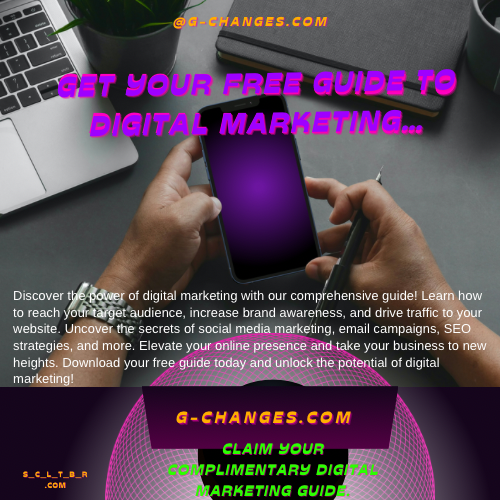Demystifying Digital Marketing: Your Free Starter Guide
- Introduction to digital marketing and its significance in the modern business landscape… Navigating the Digital Waters: A Primer on Digital Marketing in Today’s Business World
In today’s hyper-connected world, digital marketing has emerged as the cornerstone of modern business strategies. As businesses strive to stay relevant and competitive, understanding the significance of digital marketing is paramount.
Digital marketing encompasses a wide array of online tactics and channels aimed at reaching and engaging target audiences. From social media marketing and search engine optimization to email campaigns and content creation, digital marketing offers businesses unparalleled opportunities to connect with their customers in meaningful ways.
One of the key advantages of digital marketing lies in its ability to precisely target and personalize messages to specific demographics, interests, and behaviors. Unlike traditional marketing methods, digital marketing allows for real-time tracking and analysis of campaign performance, enabling businesses to optimize their strategies on the fly for maximum impact and ROI.
Moreover, digital marketing levels the playing field for businesses of all sizes. Small businesses can leverage cost-effective digital tactics to compete with industry giants, reaching global audiences without breaking the bank.
In today’s fast-paced business landscape, where consumers are constantly bombarded with information, digital marketing enables businesses to cut through the noise and engage with their audiences authentically. By fostering two-way communication and building relationships with customers, digital marketing fosters brand loyalty and advocacy, driving long-term success.
In conclusion, digital marketing is not just a trend; it’s a fundamental shift in how businesses connect with their audiences and drive growth. Embracing digital marketing strategies is essential for staying competitive and thriving in the ever-evolving
- Understanding the different channels of digital marketing: SEO, PPC, social media, content marketing, and email marketing. Certainly! Let’s delve into understanding the different channels of digital marketing: SEO and PPC.
1. SEO (Search Engine Optimization):
SEO is the process of optimizing your website to rank higher in search engine results pages (SERPs) organically. Here’s how it works:
- Keyword Research: Identifying the terms and phrases your target audience uses to search for your products or services.
- On-Page Optimization: Optimizing your website’s content, HTML, and structure to make it more search engine-friendly.
- Off-Page Optimization: Building backlinks from reputable websites and establishing your website’s authority in your industry.
- Technical SEO: Ensuring your website is crawlable, indexable, and optimized for search engine bots.
Advantages of SEO:
- Long-term sustainability: Once you achieve a high ranking, it can provide consistent traffic over time.
- Cost-effectiveness: While it requires an upfront investment in time and resources, the ongoing maintenance costs are relatively low compared to PPC.
- Credibility: Websites that appear at the top of organic search results are often perceived as more trustworthy by users.
2. PPC (Pay-Per-Click Advertising):
PPC is a form of online advertising where advertisers pay a fee each time their ad is clicked. It typically involves bidding on keywords relevant to their target audience. Here’s how it works:
- Keyword Research: Identifying high-value keywords that are likely to convert into clicks and sales.
- Ad Creation: Creating compelling ad copy and visuals that entice users to click.
- Campaign Management: Monitoring and adjusting bids, targeting parameters, and ad placements to maximize ROI.
- Conversion Tracking: Tracking the actions users take after clicking on an ad, such as making a purchase or filling out a form.
Advantages of PPC:
- Immediate results: PPC campaigns can drive targeted traffic to your website almost instantly, making it ideal for short-term goals or promotions.
- Targeting options: PPC platforms offer sophisticated targeting options, allowing you to reach specific demographics, locations, and interests.
- Measurable results: PPC campaigns provide detailed metrics and analytics, allowing you to track ROI and optimize campaigns for better performance.
Choosing the Right Channel:
Both SEO and PPC have their strengths and weaknesses, and the right choice depends on your goals, budget, and timeline. In general:
- SEO is ideal for long-term growth and sustainability, but it requires patience and ongoing effort.
- PPC is great for generating immediate results and driving targeted traffic, but it can be costly, especially in competitive markets.
Many businesses find success by incorporating both SEO and PPC into their digital marketing strategy, leveraging the strengths of each channel to achieve their goals effectively.
- Highlighting the importance of a strategic approach to digital marketing
- The benefits of digital marketing for businesses of all sizes
- What to expect from the free guide to digital marketing
Launching Your Digital Success: Earning Potential with Digital Marketing
Launching Your Digital Success: Unlocking Earning Potential with Digital Marketing”
In today’s rapidly evolving digital landscape, the power of digital marketing cannot be overstated. As businesses strive to expand their online presence and connect with a global audience, mastering the art of digital marketing opens up a world of opportunities for entrepreneurs and professionals alike.
With the right strategies and tactics, individuals can leverage digital platforms to not only promote their products and services but also to generate substantial revenue streams. Whether you’re a seasoned marketer or a newcomer to the digital realm, understanding the key principles of digital marketing is essential for maximizing your earning potential.
One of the most significant advantages of digital marketing is its ability to reach targeted audiences with precision. Through data-driven techniques such as search engine optimization (SEO), social media marketing, email campaigns, and pay-per-click advertising, businesses can tailor their messages to resonate with specific demographics, interests, and behaviors.
Furthermore, the accessibility and scalability of digital marketing make it an attractive option for businesses of all sizes. Unlike traditional forms of advertising, such as print or television, digital marketing offers flexibility and cost-effectiveness, allowing even the smallest startups to compete on a level playing field with industry giants.
However, achieving success in digital marketing requires more than just throwing money at ad campaigns. It demands a deep understanding of consumer behavior, market trends, and emerging technologies. By staying informed and continuously adapting your strategies to reflect the latest innovations and best practices, you can position yourself as a leader in your industry and capture a larger share of the digital marketplace.
Moreover, digital marketing offers countless avenues for monetization beyond direct sales. Affiliate marketing, influencer partnerships, sponsored content, and subscription services are just a few examples of alternative revenue streams that can complement your core business offerings and diversify your income sources.
In essence, mastering digital marketing is not just about promoting products or services—it’s about building relationships, fostering trust, and providing value to your audience. By consistently delivering high-quality content, engaging with your followers, and nurturing leads through every stage of the customer journey, you can create a loyal fan base and cultivate a sustainable income stream for years to come.
In conclusion, the potential for earning with digital marketing is virtually limitless. By harnessing the power of digital platforms and embracing innovative strategies, individuals can unlock new opportunities for growth, prosperity, and success in the digital age. Whether you’re an aspiring entrepreneur, a seasoned professional, or anyone in between, now is the time to seize the digital revolution and embark on a journey towards unparalleled success.
- How digital marketing can lead to revenue growth and business expansion… Digital marketing can be a powerful catalyst for revenue growth and business expansion in several key ways:
- Increased Reach and Visibility: By leveraging digital channels such as search engines, social media, email, and websites, businesses can reach a wider audience than ever before. This expanded reach allows companies to attract new customers and increase brand awareness, laying the foundation for revenue growth.
In summary, digital marketing can lead to revenue growth and business expansion by increasing reach and visibility, targeting advertising efforts more effectively, optimizing costs and resources, leveraging data-driven insights, fostering customer engagement and loyalty, and seizing global expansion opportunities. By embracing digital marketing strategies and staying ahead of industry trends, businesses can position themselves for long-term success in the digital age.
- Targeted Advertising: Digital marketing offers highly targeted advertising options, allowing businesses to tailor their messages to specific demographics, interests, and behaviors. By reaching the right audience with the right message at the right time, companies can maximize the effectiveness of their marketing efforts and drive more qualified leads.
- Cost-Effectiveness: Compared to traditional forms of advertising, digital marketing often offers a higher return on investment (ROI) for businesses. With tools like pay-per-click advertising and email marketing, companies can optimize their spending and allocate resources more efficiently, resulting in lower acquisition costs and higher profit margins.
- Data-Driven Insights: Digital marketing provides valuable data and analytics that enable businesses to measure the performance of their campaigns in real-time. By tracking key metrics such as website traffic, conversion rates, and customer engagement, companies can identify areas for improvement and make data-driven decisions to optimize their marketing strategies.
- Customer Engagement and Loyalty: Through digital channels, businesses can engage directly with their customers in meaningful ways, fostering relationships and building brand loyalty. By providing valuable content, personalized experiences, and excellent customer service, companies can strengthen their connections with customers and encourage repeat purchases and referrals.
- Global Expansion Opportunities: With the internet breaking down geographical barriers, digital marketing allows businesses to expand their reach beyond local markets and tap into new audiences around the world. Whether through e-commerce platforms, international SEO strategies, or targeted social media campaigns, companies can unlock new growth opportunities and diversify their revenue streams on a global scale.
- Starting out in digital marketing: essential tips for beginners
- Realistic expectations: Setting goals for your first 6-figures online
- Key metrics to track and measure your digital marketing efforts
- Continuous learning and adaptation: staying ahead in the evolving world of digital marketing
- Using the free digital marketing guide to kickstart your journey towards earning online… As you embark on your journey into the world of digital marketing, it’s essential to arm yourself with the knowledge, tools, and realistic expectations necessary to succeed. By setting clear goals, tracking key metrics, and embracing a mindset of continuous learning and adaptation, you can navigate the ever-changing landscape of digital marketing with confidence and precision.
First and foremost, it’s crucial to establish realistic expectations for your journey. While the potential for earning six figures online is undoubtedly attainable, it’s essential to recognize that success in digital marketing doesn’t happen overnight. Set achievable goals for your first six months or year, and be prepared to put in the time, effort, and dedication required to reach them.
Key metrics such as website traffic, conversion rates, email open rates, and social media engagement will serve as valuable indicators of your progress and success. By consistently tracking and analyzing these metrics, you can identify areas for improvement and make data-driven decisions to optimize your digital marketing efforts.
Furthermore, the world of digital marketing is constantly evolving, with new trends, technologies, and strategies emerging all the time. To stay ahead of the curve, commit yourself to continuous learning and adaptation. Whether through online courses, industry publications, or networking with fellow professionals, invest in your education and embrace change as an opportunity for growth and innovation.
Finally, leverage resources such as free digital marketing guides to kickstart your journey and gain valuable insights and strategies from seasoned professionals. These guides can provide you with practical tips, step-by-step instructions, and best practices to help you navigate the complexities of digital marketing and achieve your goals.
In conclusion, starting out in digital marketing requires a combination of realistic expectations, goal setting, metric tracking, continuous learning, and resource utilization. By following these essential tips for beginners and embracing the challenges and opportunities that lie ahead, you can set yourself up for success and unlock your earning potential in the world of online marketing
